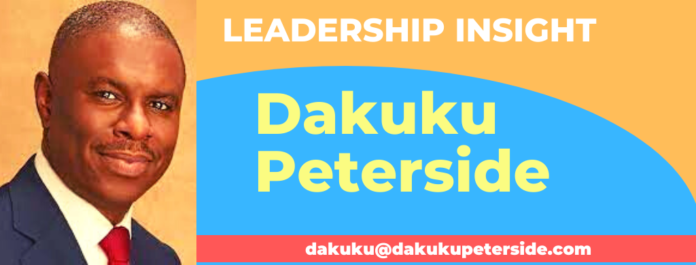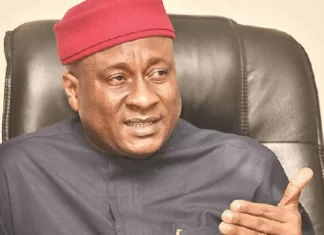I implore all stakeholders in the Nigerian project to use every opportunity available to interrogate all electoral promises inside and outside the manifestoes.
By Dakuku Peterside
We are in another election season. Political parties, jobbers, and candidates deploy everything to convince innocent voters that they mean well and have a clear agenda to transform society. Most people – con artists, comics, and patriotic citizens – attempt to present what they intend to do when elected to office. In their various interactions with the public and the media, they make statements of promises to the electorate to win their votes. These statements give an indication as to what matters to the candidates and their vision of the future of society.
No tool encapsulates the ideals and priorities of the candidates and their parties like the manifesto. Ideally, a manifesto is a compilation of the broad vision, development philosophy, ideological leaning and sector-specific policy options that a political party intends to pursue once elected.
Parties have manifestos and it is pretty much fixed, however updated regularly. Candidates of parties have an agenda or programme, which should align with the manifesto of the sponsoring party. In our clime, a candidate’s programme is often referred to as a manifesto and that is the context in which it is situated in this column. A manifesto is one of the ways of evaluating whether candidates understand the issues confronting the people and have good plans to solve them. It is also a tool to hold parties and candidates accountable for promises made during elections.
The reality in Nigerian political culture deviates, albeit in a slightly different way, from the denotative nuances of a manifesto. In Nigeria, a manifesto is more of a tradition, a political culture and not an essential requirement in a political contest. Whether citizens take it seriously or not is another matter. The belief in Nigeria, following historical precedence, is that manifestos are almost acts of a confidence trick – soundbites and promises that are intended to trick but never kept. Nevertheless, the expectation is that all political parties and presidential candidates will present their manifestoes or agenda to the public.
Two of the four presidential frontrunners have released what is somewhat of a manifesto. Atiku Abubakar of the PDP released an abridged version of his manifesto captioned “new covenant” or “my covenant with Nigerians”. Bola Ahmed Tinubu of the APC issued “Hope Renewed”. One common thing to both manifestos is that they need more detail on how they intend to accomplish what they have outlined. Labour Party’s Peter Obi and NNPP’s Rabiu Kwankwaso are yet to release any manifesto officially. Peter Obi had argued that getting wordsmiths and consultants to write and package a manifesto is not enough; candidates should be able to speak to Nigerians about what they plan to do, how they will do it and where the funds will come from to fulfil their promises.
The campaign managers and spin doctors of the two main parties, APC and PDP, are already jostling to place their manifestoes at the centre of media and public attention whilst attacking the essence and content of each other’s manifesto. Dele Momodu, journalist, and media manager of the Atiku Presidential campaign launched the first attack by describing Tinubu’s manifesto as bad recycling of late MKO Abiola’s 1993 manifesto calling it “APC manifesto of lies”. As expected, he got an immediate reply from Festus Keyamo, who described the Atiku-Okowa manifesto as merely a copy of President Buhari’s projects. At least Nigerians who have consumed enough bad news now have some comic relief.
We expect these attacks, which are part of the election campaign jostling. However, these attacks are not enough to feed the political appetites of the electorate. I expect a thorough and critical analysis of the manifestoes of each party by their opponents with the view to interrogate it and question the relevance of its content to our common aspiration. They should examine the practicality and workability of ideas and policies contained therein and task each party’s campaign managers to explain to the public some of the grey areas identified. I also expect civil society organizations, media organizations and public commentators to delve into these manifestoes and dissect them to educate the public on the content and the merits and demerits of ideas, policies, and assumptions contained in these manifestoes. The aim is to enlighten the citizens because only an enlightened citizenry will vote for candidates that align with the developmental needs and aspirations of the people.
READ ALSO: APGA gov candidate Frank Nweke proposes six steps to tackling insecurity in Enugu
The APC presidential manifesto prioritises national security, economy, agriculture, power, oil and gas, transportation, social services and education. The major highlight of the manifesto is broadly the ten promises geared to foster a new society based on shared prosperity, tolerance, compassion, and the unwavering commitment to treating each citizen with equal respect and due regard. Some of the promises include building a Nigeria, especially for our youth, where good jobs with decent wages create a better life, manufacturing, creating, and inventing more of the goods and services we require, exporting more and importing less, continuing to assist farmers, modernising and expanding public infrastructure, making primary healthcare, education, and housing accessible and affordable for all, providing electricity, and creating a security architecture to combat crime and terrorism.
On the other hand, the PDP presidential manifesto emphasises a 5-point development agenda that focuses on providing quality education, restructuring Nigeria, building a dynamic economy for prosperity, ensuring the safety and security of life and property, and restoring unity in diversity. Looking at the overall fiscal and general environment, it is doubtful that these manifestos or development agenda are realistic and implementable.
They are manifestos that will not manifest. Promises that throughout our democratic history have been made but never achieved. These promises sound so familiar to the electorate because of the recurring themes of providing electricity, security, a good economy, and infrastructure, yet we have not achieved these things, and they are still the bane of our society. Do candidates plan to rely on the manifesto to run the government? Very often, No. It is time we look beyond manifesto promises to ask candidates how they intend to make these promises a reality. How will it be funded or achieved? What is the implementation strategy?
Once elections are over, the parties and the candidate jettison the manifesto and its promises. What if we treat voting as a transaction between the voter and the elected officials, as a social contract? Should we not hold elected officials accountable if they deviate from the promises they made in their manifestoes upon which the voters cast votes? Can citizens take legal action against parties and candidates for not implementing the provisions of their manifesto? If a prospective voter has voted based on a promise, should the voter not have the legitimate expectation that the government voted to power perform based on the contract? Therefore, citizens need to take note and keep track of party manifestoes and candidates’ promises during election campaigns to hold them accountable. Besides, citizens must be able to remove nonperforming leaders before another election cycle. Though it runs a parliamentary system, the UK changed Prime Minister in 44 days because she could not deliver on the manifesto.
There is no indication that the content of a party’s manifesto substantially influences how citizens vote. Ninety per cent of eligible voters, a good chunk being illiterate by default, in Nigeria do not bother about a manifesto. Even candidates need to learn the content of their manifesto document. It is time we paid attention to party and candidates’ manifestos, interrogate them, keep track, and hold elected officials accountable. We need citizen mechanisms or actions to hold candidates responsible for their manifesto promises before periodic elections. That way, we shall deepen our democracy.
In countries such as Bhutan and Mexico, political parties are required to submit a copy of their election manifesto to the Electoral Commission before General elections. Manifestos are issued to the public only with the approval of the Electoral Commission. This has a way of making the government perform its manifesto promises. A mechanism to track and hold candidates accountable would ensure that promises merely to induce voters are not made and that promises are sincere and well-conceived.
Our democratic evolution requires that we implement systems to hold elected officials accountable for their promises to the voters. A promise is a promise and should not be made if there is no intention of keeping them. That is a fraud! Nigerian voters have been duped for so long. And we intend to bring an end to this in the 2023 general elections.
Therefore, I implore all stakeholders in the Nigerian project to use every opportunity available to interrogate all electoral promises inside and outside the manifestoes. We need to understand the vision a political party’s candidate is selling to the voters and create means of holding them to their words. I also implore the media to shun sleaze and banalities and focus on proper voters’ enlightenment based on the promises of candidates as contained in their manifestoes and other political statements.
In this day of traditional and social media prevalence, such voter education is not a herculean task. All it requires is the commitment of the information producers to enrich their content with quality political information to educate the voters and give them a chance to make informed decisions based on their convictions. Although we have many illiterate voters, this political information must reach them through media like the radio and other opinion leaders’ transmission processes that will give them access to knowledge. Democracy involves democratising knowledge and access, and we must include Nigerian voters in this crucial process.
















